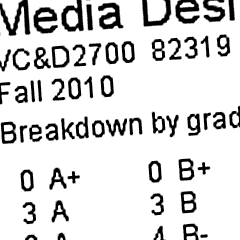Advice to an "A" student
 When I asked "What's the goal of a student?" someone immediately shouted:
When I asked "What's the goal of a student?" someone immediately shouted:
"To get an A!"
That's the problem. If you're a good student, by the time you get to college you've learned to play the game really well. You know exactly what to do to get good grades, what questions will be on the test, and how hard to push yourself. I did all that in high school: honor roll, Phi Beta Kappa, valedictorian.
I enrolled in college as a Chemistry major because that's something that smart kids did. Early in my sophomore year I had an "ah-ha" moment. I pictured myself after college working as a chemist and realized that wasn't how I wanted to spend my life. At that moment I decided to change my major to Art. Never regretted it.
Don't be a good student
A few days ago I was thinking about students in my Media Design class, some blossoming and some struggling. They're in the ongoing struggle to come up with great ideas, develop them, and implement them. In trying to figure out how to help, it dawned on me that the best thing they could do would be to give up being good students. What they need is to be good designers, or illustrators, or visual communicators.
To see yourself as a person who is learning to do something—whether it's design or woodworking or brain surgery—is to understand that your goal must be learning all the skills you need to do this thing, not to get an A in class.
Every teacher and most students know that the most brilliant person in the room doesn't always get the highest grade, and we've all seen A students whose work isn't the best. Since all learning requires trial and error we probably ought to give the highest grades to those who fail the most. I struggle with that every time I rework a class syllabus and get to the "Grading Policy" section.
Does it fit?
I asked my students to try to really think and act as the person they hope to become: designer, photographer, illustrator. After doing that for a while It could be that you realize that those clothes don't fit you. That's something valuable to learn in itself. The white lab coat of a chemist sure didn't work for me.
As I write this I realize that it sounds like I'm equating what you do with who you are, and I know that we are all much more than that. Still, for most of us the work we do is a huge part of the mix. If we get that right the rest often falls into place more easily.
There's a case you could make for focusing on the life of a student while you're in college. After all, going to basketball games, drinking beer and getting laid are important parts of life too. For better or for worse, though, many of my students are more concerned with life after college. For those individuals, I truly believe that the role of student is keeping them from getting the most of their education.
So to all you good students: stop it! Right now.
Why give grades at all?
[Added November 9, 2010 as a result of online discussion]
I've found that many students don't seem to take feedback seriously until they see something in black and white—something like a "C" or "D". So I give letter/number grades because I haven't found a better way to give meaningful feedback. I'm open to suggestions.
My grading structure always includes multiple concerns, typically "Concept", "Development", "Challenge" and "Execution" (or "Craft" or "Technical"), so I'm not looking for a specific outcome except when dealing with technical concerns. Students always have the option of re-doing a project if they are not satisfied with the grade.
My point is, do every project to the best of your ability, learn everything you can from it, redo if you're not satisfied, and move on. Students who do that are likely to get good grades, but the grade isn't what's important, it's the learning that happens along the way.
Join the conversation
Click on "Comments" below to read what other teachers and students have to say, and please add your own ideas to the conversation.
